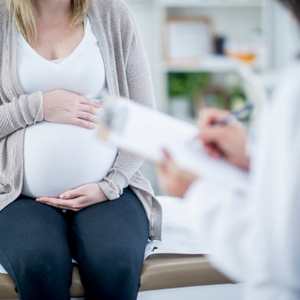Group B Streptococcus (GBS) is a common type of bacteria that is often present in the vaginal canal and/or digestive tract of healthy adults. GBS can infect newborns during labor and delivery and lead to an infection called group B strep disease, which is very serious and can even be fatal.
GBS screening and prophylactic antibiotic treatment can help reduce the chances of a newborn developing this serious infection, which is without question a good thing.
However, universal screening for GBS leads to a significant proportion of the population receiving unnecessary antibiotics during labor. This practice causes long-term harm to otherwise healthy mothers and babies, and it contributes to the problem of antibiotic resistance.
This begs the questions: Does screening for GBS in pregnancy cause more harm than good and is there a better way to protect vulnerable babies from group B strep disease while reducing the amount of harm done to healthy mothers and their babies?
What Is GBS? And Why Do We Screen For It?
GBS stands for Group B Streptococcus. This is a type of bacteria that is normally found in the reproductive, urinary, and digestive tracts of many healthy people. It rarely causes harm in adults except in lowered immunity states.

The reason that we screen for GBS is that it can, in rare instances, cause a serious condition in newborns called group B strep disease.
In the United States, all expecting mothers are offered a group B strep test in the final weeks of their pregnancy (weeks 36-37). If they test positive for GBS, they will be given an IV antibiotic when labor begins to prevent group B strep infection in the baby.
Symptoms Of Infant Group B Strep Disease
GBS can infect the blood, lungs, or nervous system of newborns during labor and delivery. Early onset symptoms occur within the first few hours after birth, while late-onset symptoms can occur weeks or even months later. Group B strep disease is very serious and can lead to long-term disability or death.
Group B strep infection can lead to meningitis, pneumonia, or sepsis. Signs and symptoms of group B strep disease include irritability, excessive sleepiness, difficulty feeding, low body temperature or fever, floppy limbs or lack of muscle tone, decreased movement of an arm or leg, difficulty breathing, grunting noises while breathing, seizures, rash, and jaundice.
Group B strep disease is diagnosed via laboratory tests of body fluids like blood and/or spinal fluid. It is treated in the NICU with antibiotics and other supportive treatments as needed.
How Effective Is Universal Screening At Preventing Group B Strep Disease?
Group B strep is a bacteria that comes and goes from the vaginal tract. That means that screening for GBS before birth won’t catch every potential case of Group B strep disease. However, universal screening detects approximately 65% (~⅔) of infants who would go on to develop an infection.
Unfortunately, some infants will develop group B strep disease even with testing and antibiotic treatment.
What Is The Harm Of Screening For GBS?
Approximately 20% (⅕) of women will test positive for GBS, but only 0.1-0.2% of infants will go on to get group B strep disease. If every woman positive for GBS gets antibiotics, that leads to a lot of unnecessary antibiotics consumed.
Researchers in the UK considered implementing universal GBS screening but decided against it because of the high false positive rate and uncertain benefit. According to their calculations, 99.8% of women who would receive preventative antibiotics wouldn’t need them and it would increase the rate of antibiotic use in UK pregnancies from 11% to 27%. Instead, the UK uses risk-based screening for group B strep.
Consequences Of Unnecessary Antibiotic Treatment
Over 40% of American women receive antibiotics during labor and delivery, whether for GBS prevention, cesarean section, or another clinical reason. This means that almost half of American children start their life with a disruption to their microbiome. This may predispose these kids to metabolic problems, diabetes, obesity, allergic conditions (eg asthma and eczema), autoimmune conditions, and autism.
This practice also puts a burden on new mothers who have to deal with the side effects of antibiotic use in addition to recovering from childbirth. These side effects could include oral thrush, vaginal yeast infections, digestive problems, and more.
Antibiotic overuse also contributes to the emerging problem of antibiotic-resistant bacteria.
Read more: How To Avoid Side Effects of Antibiotics Using Natural Medicine – Dr. Green Mom
Risk-Based Screening: Alternative To Universal Screening For GBS
Some countries use risk-based screening as an alternative to universal screening for GBS. Risk-based screening means that only mothers with certain risk factors would be offered a GBS test and antibiotic treatment during labor.

Newborns are at higher risk for group B strep infection in the case of:
- Preterm birth
- More than 18 hours between water breaking and birth
- Fever in the mother
- Internal fetal monitoring during labor
- Previous pregnancy with a baby who had group B strep
- GBS positive urine test
- African-American or Hispanic ethnicity
- Young maternal age
- Very low birth weight
- Socioeconomic disadvantage
- Low levels of anti-capsular antigen in mother (detected by a blood test)
It is still unclear whether risk-based screening or universal screening leads to better outcomes for moms and babies and whether or not it leads to lower antibiotic rates.
Reducing The Likelihood Of GBS Colonization
Though the jury is still out about whether or not universal screening or risk based screening is better for the prevention of group B strep disease, I believe that prevention of group B strep colonization before birth is an option that could result in less unnecessary antibiotic use and less group B strep disease.
Prevention of group B strep colonization has benefits for mothers as well. Women who are GBS positive at birth are more likely to need a cesarean section, have preterm labor/birth, get chorioamnionitis (infection of the placenta and amniotic fluid), get endometritis (postpartum infection of the womb), and/or experience heavy bleeding after birth.
It’s important to note that while GBS prevention strategies decrease the chances of GBS colonization, they don’t eliminate the risk completely. In my practice, I still recommend GBS testing, especially if risk factors are present.
Read more: Natural Treatment For Group B Strep In Pregnancy – Dr. Green Mom
An Important Note About Antibiotics In Labor
It is important to note that while over treatment with antibiotics in labor can lead to unnecessary side effects, appropriate treatment with antibiotics during labor, or at any other time, can save lives and prevent or treat many serious conditions.
If you need or choose to use antibiotics in labor because of risk factors, a positive GBS test, or clinical signs that you may need antibiotics, please know that I support you. I have benefited from antibiotic treatment as have many of my patients. Side effects can be managed. There’s evidence that breastfeeding and/or oral supplementation of infants with a probiotic can help.
If antibiotics are the right choice for you or your family during or after labor (or at any time), do not feel pressure to avoid them to be natural or for fear of their side effects.
If you’ve had to use antibiotics for yourself or your children in the past, please do not worry. Conditions that antibiotic use contributes to are multifactorial; there are many protective factors to consider as well. If you’re doing your best to live a healthy, loving life with your family, you’re doing a great job! Your kids are lucky to have you looking out for them!
You may also be interested in:
How To Avoid Side Effects of Antibiotics Using Natural Medicine – Dr. Green Mom
How to Heal The Gut (For Kids) – Dr. Green Mom
Basics Of An Anti-Inflammatory Lifestyle – Dr. Green Mom
The Basics Of Anti-Inflammatory Eating For The Whole Family – Dr. Green Mom
Summary
Group B strep is a type of bacteria that is present in the microbiome of many healthy adults. Unfortunately, it may cause group B strep disease in infants if they contract it during labor and delivery.
To prevent group B strep disease in infants, it is standard practice in the United States to screen all pregnant mothers for GBS before birth and to give GBS positive mothers antibiotics during labor and delivery. Though universal screening reduces the number of babies who get group B strep, it exposes many infants and mothers to unnecessary antibiotic treatment, which comes with a host of short and long term side effects.
Screening for group B strep is a complicated issue. My opinion is that universal GBS screening may cause more harm than good and that more research is needed about what policy leads to the best health outcomes. In the meantime, pregnant mothers can try natural therapies to prevent and treat GBS colonization earlier in pregnancy.
Read my article about GBS prevention and treatment.
References:
Seedat, F., Geppert, J., Stinton, C., Patterson, J., Freeman, K., Johnson, S. A., Fraser, H., Brown, C. S., Uthman, O. A., Tan, B., Robinson, E. R., McCarthy, N. D., Clarke, A., Marshall, J., Visintin, C., Mackie, A., & Taylor-Phillips, S. (2019). Universal antenatal screening for group B streptococcus may cause more harm than good. BMJ (Clinical research ed.), 364, l463. https://doi.org/10.1136/bmj.l463
Ainonen, S., Tejesvi, M. V., Mahmud, M. R., Paalanne, N., Pokka, T., Li, W., Nelson, K. E., Salo, J., Renko, M., Vänni, P., Pirttilä, A. M., & Tapiainen, T. (2022). Antibiotics at birth and later antibiotic courses: effects on gut microbiota. Pediatric research, 91(1), 154–162. https://doi.org/10.1038/s41390-021-01494-7
Rao, G. G., & Khanna, P. (2020). To screen or not to screen women for Group B Streptococcus (Streptococcus agalactiae) to prevent early onset sepsis in newborns: recent advances in the unresolved debate. Therapeutic advances in infectious disease, 7, 2049936120942424. https://doi.org/10.1177/2049936120942424
Hasperhoven, G. F., Al-Nasiry, S., Bekker, V., Villamor, E., & Kramer, B. (2020). Universal screening versus risk-based protocols for antibiotic prophylaxis during childbirth to prevent early-onset group B streptococcal disease: a systematic review and meta-analysis. BJOG : an international journal of obstetrics and gynaecology, 127(6), 680–691. https://doi.org/10.1111/1471-0528.16085
Brown, A. P., & Denison, F. C. (2018). Selective or universal screening for GBS in pregnancy (review). Early human development, 126, 18–22. https://doi.org/10.1016/j.earlhumdev.2018.09.002
Tapiainen, Terhi & Koivusaari, Pirjo & Leone, Lauren & Lorenzi, Hernan & Salo, Jarmo & Renko, Marjo & Pruikkonen, Hannele & Pokka, Tytti & Li, Weizhong & Nelson, Karen & Pirttilä, Anna Maria & Tejesvi, Mysore. (2019). Impact of intrapartum and postnatal antibiotics on the gut microbiome and emergence of antimicrobial resistance in infants. Scientific Reports. 9. 10.1038/s41598-019-46964-5.
Chan, Ying & Lau, Steven & Hui, Annie & Ma, Teresa & Kong, Choi & Kwong, Lee & Chan, Diana & Lee, Diana & Mok, Sau & Ma, Vinci & Lo, Yim & Leung, Kwok & Leung, Wing. (2022). Incidence of neonatal sepsis after universal antenatal culture‐based screening of group B streptococcus and intrapartum antibiotics: A multicentre retrospective cohort study. BJOG: An International Journal of Obstetrics & Gynaecology. 10.1111/1471-0528.17279.
Fan, S.R & Tasneem, Umber & Liu, Xiao-Ping & Yan, Shao-Mei. (2020). Prevention of Perinatal Group B Streptococcus Infections. Maternal-Fetal Medicine. 2. 100-109. 10.1097/FM9.0000000000000041.
Martinez de Tejada B. Antibiotic use and misuse during pregnancy and delivery: benefits and risks. Int J Environ Res Public Health. 2014 Aug 7;11(8):7993-8009. doi: 10.3390/ijerph110807993. PMID: 25105549; PMCID: PMC4143845.
Garlic: An Alternative Treatment for Group B Streptococcus | Microbiology Spectrum
Nascimento, Cilicia & Custodio, Brenda & Taddei, Carla. (2021). Can garlic be used to treat Group B Strep infection? And what happens to Lactobacilli?. 10.13140/RG.2.2.18184.55040.
Nascimento, Cilicia & Taddei, Carla. (2021). What is happening between Group B Streptococcus and Lactobacillus?. 10.13140/RG.2.2.24895.43687.
Shiroda, M., Aronoff, D. M., Gaddy, J. A., & Manning, S. D. (2020). The impact of Lactobacillus on group B streptococcal interactions with cells of the extraplacental membranes. Microbial pathogenesis, 148, 104463. https://doi.org/10.1016/j.micpath.2020.104463
Martín, V., Cárdenas, N., Ocaña, S., Marín, M., Arroyo, R., Beltrán, D., Badiola, C., Fernández, L., & Rodríguez, J. M. (2019). Rectal and Vaginal Eradication of Streptococcus agalactiae (GBS) in Pregnant Women by Using Lactobacillus salivarius CECT 9145, A Target-specific Probiotic Strain. Nutrients, 11(4), 810. https://doi.org/10.3390/nu11040810
Rosen, G. H., Randis, T. M., Desai, P. V., Sapra, K. J., Ma, B., Gajer, P., Humphrys, M. S., Ravel, J., Gelber, S. E., & Ratner, A. J. (2017). Group B Streptococcus and the Vaginal Microbiota. The Journal of infectious diseases, 216(6), 744–751. https://doi.org/10.1093/infdis/jix395
Liu, Y., Huang, Y., Cai, W., Li, D., Zheng, W., Xiao, Y., Liu, Y., Zhao, H., & Pan, S. (2020). Nan fang yi ke da xue xue bao = Journal of Southern Medical University, 40(12), 1753–1759. https://doi.org/10.12122/j.issn.1673-4254.2020.12.09
Edwards, J. M., Watson, N., Focht, C., Wynn, C., Todd, C. A., Walter, E. B., Heine, R. P., & Swamy, G. K. (2019). Group B Streptococcus (GBS) Colonization and Disease among Pregnant Women: A Historical Cohort Study. Infectious diseases in obstetrics and gynecology, 2019, 5430493. https://doi.org/10.1155/2019/5430493
Khan, M. A., Faiz, A., & Ashshi, A. M. (2015). Maternal colonization of group B streptococcus: prevalence, associated factors and antimicrobial resistance. Annals of Saudi medicine, 35(6), 423–427. https://doi.org/10.5144/0256-4947.2015.423







